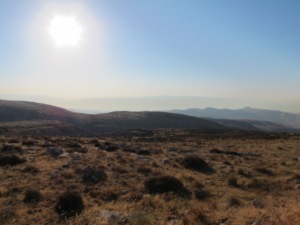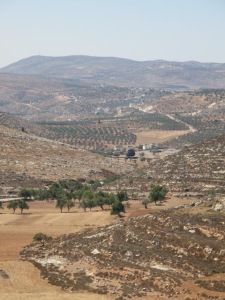“I lift up my eyes to the hills — from where will my help come? My help comes from the Lord, who made heaven and earth.” – Psalm 121:1.

In Palestine, you can’t help but look at the hills. They are all around! They define so much of Palestine.
Even in these arid months, when everything is various shades of brown, they have their own beauty and grandeur, with one hill majestically rolling-on — after — and into another.
Despite being rock, with shallow patches of soil, sometimes these hills are dotted with olive trees. They are also pasture to shepherds and their flocks, creating some idyllic pastoral scenes. Often they have been tamed over the centuries with terraces.
The hills are alive! They are the life of local peasant Palestinian farmers, and Bedouins living off the land in the Jordan Valley.
In reality, the West Bank is all about hills — both geologically and politically. It’s about who’s on top of any given hill: Pasture for farmers, a Palestinian village, or an Isreali outpost, settlement, or an army post? You quickly learn to spot, who is on top.
The current Israeli-Palestinian conflict is largely about who will have most hills at the end of the day.
In Yanoun, where I serve for three months with the World Council of Churches Ecumenical Accompaniment Program in Palestine and Israel (EAPPI), there’s a piece of me that does not want to lift up my eyes unto the hills when ever Psalm 121 comes to mind — which is often as I walk the Yanoun valley! (The hills actually cue the psalm in my mind.)

Why? Because the hilltops are a graphic reminder of why I am in Yanoun, with other internationals.
Yanoun just may be the smallest surviving Palestinian village in the West Bank. EAPPI maintains a team here 24/7/365 as a “protective presence.”
(We also relate to and support 30 nearby villages with similar experiences and issues (land, water, demolitions, settler violence, army incursions etc.), and also the Christian communities of Nablus.)
First, and foremost, we are a protective presence and “witnesses,” because Yanoun routinely experiences settler attacks from the nearby Itamar Israeli settlement and outposts. Yanoun is all but surrounded! And a few of the Itamar folk are very aggressive.

To be honest, it’s a challenge to photograph the phenomena of being surrounded. But there is one to the right, one to the left, one across from Yanoun with army presence – and one right above us! The closest is only 400 m away! Way too close for comfort!

There has been conflict at times in Yanoun as the settlers have tried to drive them out, and off their land.
The problem is that Yanoun is “in the way.” It is in the way of a swath of settlements, and outposts running from the border between the Occupied Palestinian Territories and Israel on the west, right through the West Bank to the Jordan River valley.

There are now several of these bands of settlement right across Palestine.
These bands have often been been achieved through settler violence toward locals, army muscle, the confiscation of property, land, and water, and the demolition of homes and tents.
In simplest terms, it’s the living-out of the words of Ariel Sharon:
“Everybody has to move, run and grab as many (Palestinian) hilltops as they can to enlarge the (Jewish) settlements because everything we take now will stay ours… Everything we don’t grab will go to them.” — Ariel Sharon, Israeli Foreign Minister, addressing a meeting of the Tsomet Party, Agence France Presse, Nov. 15, 1998.

At the same time, he also said, “It is the duty of Israeli leaders to explain to public opinion, clearly and courageously, a certain number of facts that are forgotten with time. The first of these is that there is no Zionism, colonialization, or Jewish State without the eviction of the Arabs and the expropriation of their lands.”
Yes, who ever has the most hills wins!
And the Palestinains are losing right, left, and centre! They have been losing this one for a couple of decades!
Now, despite my hesitation, I do look to the hills when Psalm 121 comes to mind, and I will look to the God of justice and mercy, who companions us on the journey. I hope and pray this One who neither sleeps nor slumbers will call us all — Israelis, Palestinains, and internationals; Jews, Christians and Muslims — to our best selves, to our best values, and to our sacred teachings and stories about how to be with one another — here, and anywhere!
Grace and peace…
Jim
I have been sent by the United Church of Canada to participate in the World Council of Churches (WCC) Ecumenical Accompaniment Programme in Palestine and Israel (EAPPI). Should you wish to re-post, or to publicize any of this content, I welcome your direct requests, via the comments section in this blog. Thank you!


